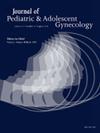Adult Obstetricians and Gynecologists Lack Knowledge of Anorectal Malformations—A Call for Action
IF 1.7
4区 医学
Q3 OBSTETRICS & GYNECOLOGY
引用次数: 0
Abstract
Objective
Patients with anorectal malformations (ARMs) may have concurrent gynecologic abnormalities. As patients grow, they typically transition from pediatric subspeciality care and seek adult obstetrics and gynecology (OB/GYN)-related services. We aimed to assess adult OB/GYN physicians’ knowledge, competency, and comfort regarding meeting the sexual and reproductive health care needs of patients with ARMs.
Methods
We performed a cross-sectional observational survey-based study of graduates from a single academic OB/GYN residency program from 2013 to 2022. Physicians were surveyed on experience, comfort, and challenges with caring for patients with ARMs and given a knowledge assessment. Descriptive and comparative statistics between those who did and did not complete a Pediatric and Adolescent Gynecology (PAG) rotation were generated.
Results
There were 59 respondents (53.6%). Fewer than half (39.0%) reported caring for a patient with an ARM, an appendicovesicostomy (12.3%), or an appendicostomy (5.4%). Most felt uncomfortable (80.4%) or felt they lacked competence in caring for these patients (81.8%). Most (64.3%) felt that ARMs should be discussed in residency. Only 1 physician (1.7%) answered all questions in the knowledge assessment correctly; 33.9% did not answer any question correctly. On subgroup analysis, more physicians who had completed a pediatric and adolescent gynecology rotation recalled learning about ARMs (83.3% vs 51.9%, P = .03); however, there were no differences in experience, comfort, competence, or willingness to learn.
Conclusion
OB/GYN providers report a lack of knowledge and comfort in caring for patients with ARMs. Development of a standardized OB/GYN residency curriculum and education for practicing OB/GYN physicians is necessary to allow access to knowledgeable sexual and reproductive health for this patient population.
成人妇产科医生对肛门直肠畸形缺乏了解--呼吁采取行动:妇科医生对肛门直肠畸形缺乏了解。
目的:肛门直肠畸形(ARM)患者可能同时伴有妇科异常。随着患者的成长,他们通常会从儿科亚专科护理过渡到寻求成人妇产科相关服务。我们的目的是评估成人妇产科医生在满足 ARM 患者的性健康和生殖健康护理需求方面的知识、能力和舒适度:方法:我们对 2013-2022 年间来自单一学术性妇产科住院医师培训项目的毕业生进行了一项横断面观察调查研究。我们调查了医生在护理 ARM 患者方面的经验、舒适度和挑战,并对他们进行了知识评估。对完成和未完成儿科和青少年妇科(PAG)轮转的医生进行了描述性和比较性统计:共有 59 名受访者(53.6%)。只有不到一半的受访者(39.0%)表示护理过患有 ARM、阑尾切除术(12.3%)或阑尾造口术(5.4%)的患者。大多数人在护理这些病人时感到不舒服(80.4%)或觉得自己缺乏能力(81.8%)。大多数人(64.3%)认为应在住院医师培训中讨论 ARM。只有一名医生(1.7%)正确回答了知识评估中的所有问题;33.9%的医生没有正确回答任何问题。在分组分析中,更多完成 PAG 轮转的医生回忆起学习过 ARMs(83.3 vs 51.9%,P=0.03);但在经验、舒适度、能力或学习意愿方面没有差异:结论:妇产科医护人员在护理 ARM 患者方面缺乏知识和舒适感。有必要制定标准化的妇产科住院医师课程并对妇产科执业医师进行教育,使这一患者群体能够获得性健康和生殖健康方面的知识。
本文章由计算机程序翻译,如有差异,请以英文原文为准。
求助全文
约1分钟内获得全文
求助全文
来源期刊
CiteScore
3.90
自引率
11.10%
发文量
251
审稿时长
57 days
期刊介绍:
Journal of Pediatric and Adolescent Gynecology includes all aspects of clinical and basic science research in pediatric and adolescent gynecology. The Journal draws on expertise from a variety of disciplines including pediatrics, obstetrics and gynecology, reproduction and gynecology, reproductive and pediatric endocrinology, genetics, and molecular biology.
The Journal of Pediatric and Adolescent Gynecology features original studies, review articles, book and literature reviews, letters to the editor, and communications in brief. It is an essential resource for the libraries of OB/GYN specialists, as well as pediatricians and primary care physicians.

 求助内容:
求助内容: 应助结果提醒方式:
应助结果提醒方式:


